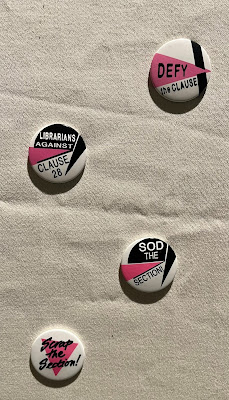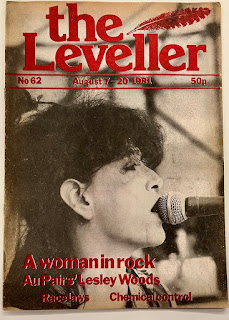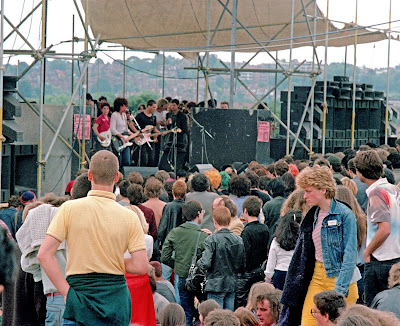Wednesday, March 23, 2022
London Club Listings 1982
Sunday, March 13, 2022
Gays Against Nazis, Leeds 1978
Sunday, March 06, 2022
Skibadee remembered on home turf
The great junglist/drum & bass MC Skibadee died last month and fittingly is the subject of lots of memorial graffiti around Waterloo in South London where he was born, particularly in the graffiti tunnels under the station (Leake Street)
 |
| Alphonso Bondzie (his real name) |
 |
| 'Skibadee, 1.2.1975 - 27.2.2022' |
 |
| 'inspired, loved, taught and pioneered, world's no.1 jungle and D&B Emcee Skibadee' |
Wednesday, February 23, 2022
Song of the Living Corpses - Japanese Textile Workers' Ballads
As Japan industrialised in the late 19th and early 20th century large numbers of young women were employed in textile mills, often living in tightly regulated dormitories under the control of their employers. Like people in many places they sang songs of despair and defiance.
Here's some extracts from a few textile workers' ballads, from an article by E Patricia Tsurumi (Female Textile Workers and the Failure of Early Trade Unionism in Japan, History Workshop Journal, 18, Autumn 1984).
Monday, February 21, 2022
Parallel Mothers: History refuses to shut its mouth
Lots to love in 'Parallel Mothers'/'Madres Paralelas' (2021), the latest Pedro Almodóvar film.
 |
| 'No history is mute. No matter how much they burn it, break it, and lie about it, human history refuses to shut its mouth'. |
Monday, February 07, 2022
Stop Clause 28 - a queer (near) riot in London, 1988
 |
| Pink Paper front cover, 14 January 1988 |
 |
 |
| (note advert for Fallen Angel bar in Islington - I believe the Pink Paper had an office upstairs there at one point. Used to go there for lunch when working in Islington in early 1990s) |
 |
| List of banners on the demo |
 |
| 'the first breath of a chilling wind of intolerance' |
 |
| Report from Counter Information, February 1988 - referring to 'Jill's Bill' as it was proposed by Dame Jill Knight, a Conservative politician who had been a member of the far right Monday Club. |
Wednesday, February 02, 2022
A Jewish Ball in London (1859)
'Yesterday evening a grand ball, attended by the leading members of the Hebrew persuasion in the city, took place at the London Tavern, in celebration of the removal of the Jewish disabilities and in aid of the funds of the Jews' General Literary and Scientific Institution.
The ball took place in the large room of the tavern, which has recently been entirely re-decorated in simple, but most graceful, style making it one of the handsomest as it has long been one of the finest in the city of London. Dancing commenced about 10 o'clock - the band being led by Mr La Motte - and was continued with the utmost spirit till the lights began to 'pale their ineffectual fires'. Upwards of 200 of the leading members of Jewish firms were present' (Times 4th February 1859).Tuesday, January 25, 2022
Simulmatics, sorcery and counter-insurgency
The murky story of American “psychological operations” in the Vietnam war features many strange episodes. As told in ‘If Then: How One Data Company Invented the Future’ by Jill Lepore ((2020) this included the largely unsuccessful efforts of a private company contractor, The Simulmatics Corporation.
Set up in 1959, the company pioneered the use of computers for market research and predictive modelling. As early as 1960 they had begun developing what they termed the People Machine ‘a computer program designed to predict and manipulate human behavior, all sorts of human behavior, from buying a dishwasher to countering an insurgency to casting a vote’.
At their suggestion the Pentagon established the Hamlet Evaluation System in 1966, a massive bank of computerized data [...] compiled, updated, and analyzed, day by day, on 12,500 strategic hamlets in forty-four provinces’ in Vietnam, supported by more than 300 staff.
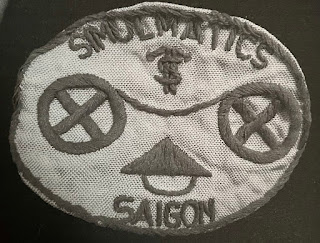 |
| Simulmatics Saigon uniform patch |
In Vietnam one of Simulmatics' operatives was Joseph Hoc, a locally born Catholic priest. His plans included ‘something called the Sorcerers Project, he explained, because "Vietnamese villagers believe in prophecy and the power of holy men to foretell the future." For this project he intended to circulate false magic, the way another sort of psychological warrior might circulate, for instance, fake news. Alas, "the sorcerers did not say what they were supposed to say."
Linked to this, his 'Prophesy Project' saw thousands of booklets being distributed with a prophesy that "the Viet Cong will be defeated in 1969". Unfortunately for him, very few believed it.
Another initiative, the Folksinger Project, 'involved composing new folk songs intended to "inject dislike and hatred of the V[iet] C[ong]." But North Vietnamese attacks immobilized all of Ho's folksingers'.
As uprisings spread through the United States in 1967 the company turned its efforts to riot research and prediction, using computers and questionnaires. As Lepore observes 'Simulmatics' work on riot prediction in American cities bore an eerie similarity to McNamara's giant computer program, the Hamlet Evaluation Study, which, after all, aimed to predict insurgency. In the United States, Simulmatics attempted to determine the "Mood and Atmosphere Within Riot Community" and to assign it a number ("1-Calm restrained; 2-Tense; 3-Angry; 4-Fearful,nervous; 5-Apathetic; 6-Euphoric, Carnival; 7-Friendly, good-willed; 8-Chaotic; 9-Orderly; 10-Other")'
The company was targeted by anti-Vietnam war protesters including Students for a Democratic Society at Massachusetts Institute of Technology, which had links to the company. Simulmatics was declared bankrupt in 1970. Lepore suggests that one reason was that it’s ideas were ahead of what the technology could actually deliver in the 1960s but that its vision has subsequently been realised by corporations like Facebook, Google, Amazon and Cambridge Analytica.
Wednesday, January 19, 2022
The Au Pairs - 1981 Interview with Lesley Woods
'9 August 1980. Ninth anniversary of internment, and the Au Pairs are playing a free gig for the kids in West Belfast. Rock The Block - it's in support of the women in Armagh and the men on the blanket in H-Block. The band deliver a tight set, mostly songs written by singer Woods about sexual politics, roles and relationships. The audience are stunned by Lesley; they've never seen anyone like her.' (Kate Webb, in The Book of the Year, Ink Links, 1980)
The Au Pairs were one of the most interesting of UK post-punk bands, exploring subject matter rarely if ever explicitly addressed in music from the sexual politics of relationships to the abuse of Irish women prisoners (the subject of their song Armagh). Their politics was a thread through everything they did, from their guitar playing to their choice of benefit gigs. They played for Rock Against Racism (indeed were started out by people involved in Birmingham RAR), Rock Against Sexism and various other causes.
This interview is from the radical left magazine 'The Leveller' (August 7-20 1981). True to style it took place at a No Nukes Music gig the band were playing at Lambeth Town Hall in Brixton (just round the corner from The Leveller's office at 52 Acre Lane SW2).
 |
| (click image to enlarge) |
Extracts from interview:
'I don't think you can have any political awareness, though, without being aware of the way women are exploited in this society; it's a patriarchal society and women are oppressed. People are so paranoid about being told that, but it just happens to be a fact, not a point of view, a fact, and an inevitable result of the way society is organised right down to the basics. Capitalist society relies on the family, and women exist for the family and for producing children. In our society anybody who's involved in production gets exploited... I just read that today! Brecht's The Mother. It's really good. I get fed up always having to apologise or to defend the argument that women are oppressed. It is a fucking fact; not my point of view, or the left's point of view. I don't know what the solution is. I don't see a solution. But I could say that if every woman in the world decided to stop fucking with men and just became separatist then you'd be forcing the issue!'
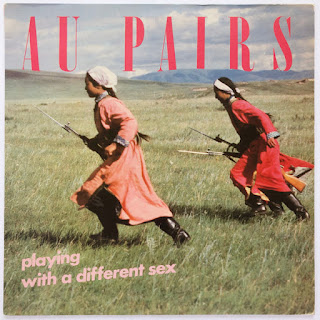 |
| I used to have t-shirt with this on! |
Monday, January 17, 2022
The Sanctuary - Hardcore in Milton Keynes, 1991-2004
Milton Keynes Gallery has been hosting an exhibition on the famous MK club The Sanctuary (it closes on 23 January 2022).
'How did an unsuspecting Milton Keynes warehouse become one of the UK’s largest and most beloved rave venues? Sanctuary: The Unlikely Home of British Rave will tell the story of the infamous all-night club that operated in the city from 1991-2004, drawing close to an estimated million ravers from across the country.
The exhibition, an archive project that will display original ephemera, flyers, merchandise, artefacts, footage and more, is curated by Emma Hope Allwood, a writer and former Dazed editor who grew up around Milton Keynes. “It wasn’t until I became a journalist and came across the flyer for Dreamscape 1 that I learned of The Sanctuary,” she says. “For me, this project is about doing justice to the youth culture history of MK – a place which is too often unfairly maligned as a cultural void.”
'1991. A man walks into Milton Keynes Council's offices. His name is Murray Beetson, and he wants to put on a rave. The proposed venue? An empty warehouse in Denbigh North, little more than a colossal silver shell. A licence is granted, and one night in December, thousands show up for an event that goes down in history: Dreamscape 1.
Officially opening as The Sanctuary in 1992, the club marks a new chapter in the story of British rave. The hedonistic freedom of the late 1980s acid house movement - where fields and abandoned buildings were transformed into all-night venues - has become the target of Conservative politicians and scaremongering media.
The party isn't over, it just has to adapt: emerging from the underground into licensed, legal venues.The Sanctuary is one of them. Over the following decade, hundreds of thousands make the pilgrimage there, cars of excited ravers snaking down motorways to dance until dawn to jungle, hardcore, and drum & bass in one of Britain's biggest clubs' (from exhibition).
The exhibition includes flyers for various events held there including Dreamscape and Helter Skelter, as well as some for earlier house/techno nights not far away at Rayzels in Bletchley.
Press headlines tell of the usual troubles of drug casualties, dealers and some more comic moments like the one about the 'Missing Raver' found asleep in a field.
There are also memories left by visitors
 |
| 'people lying on the floor in white t-shirts having conversations and standing up filthy!' |















